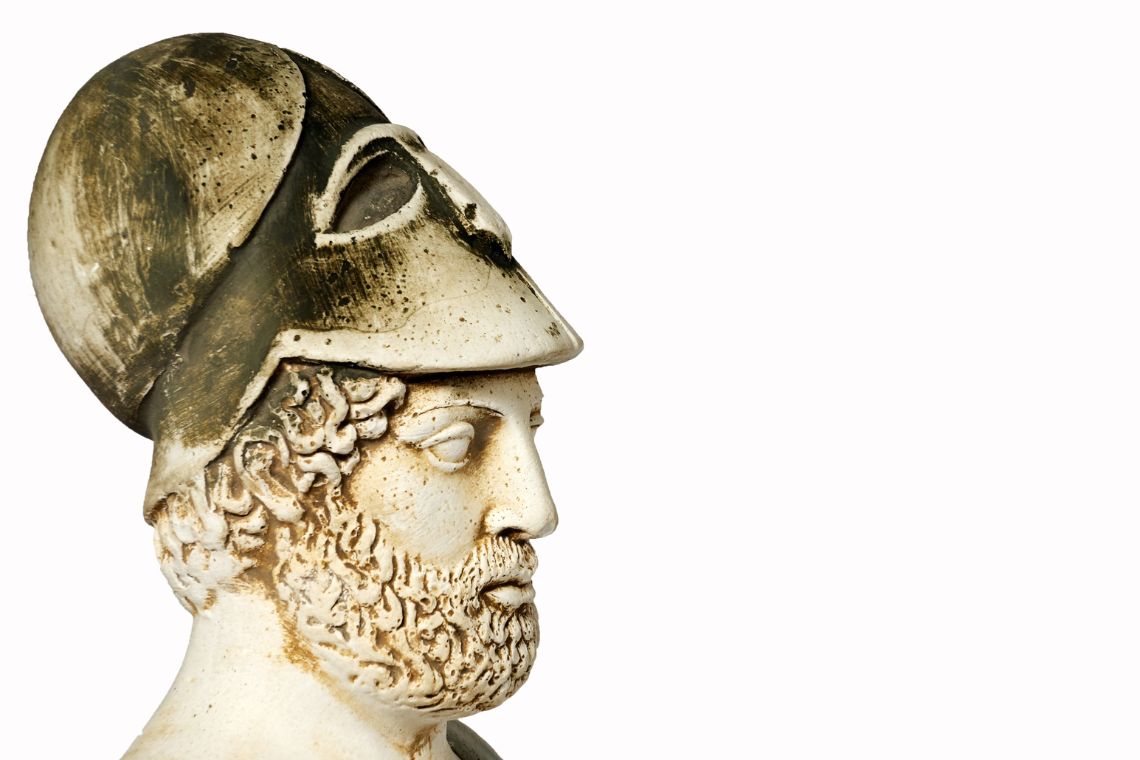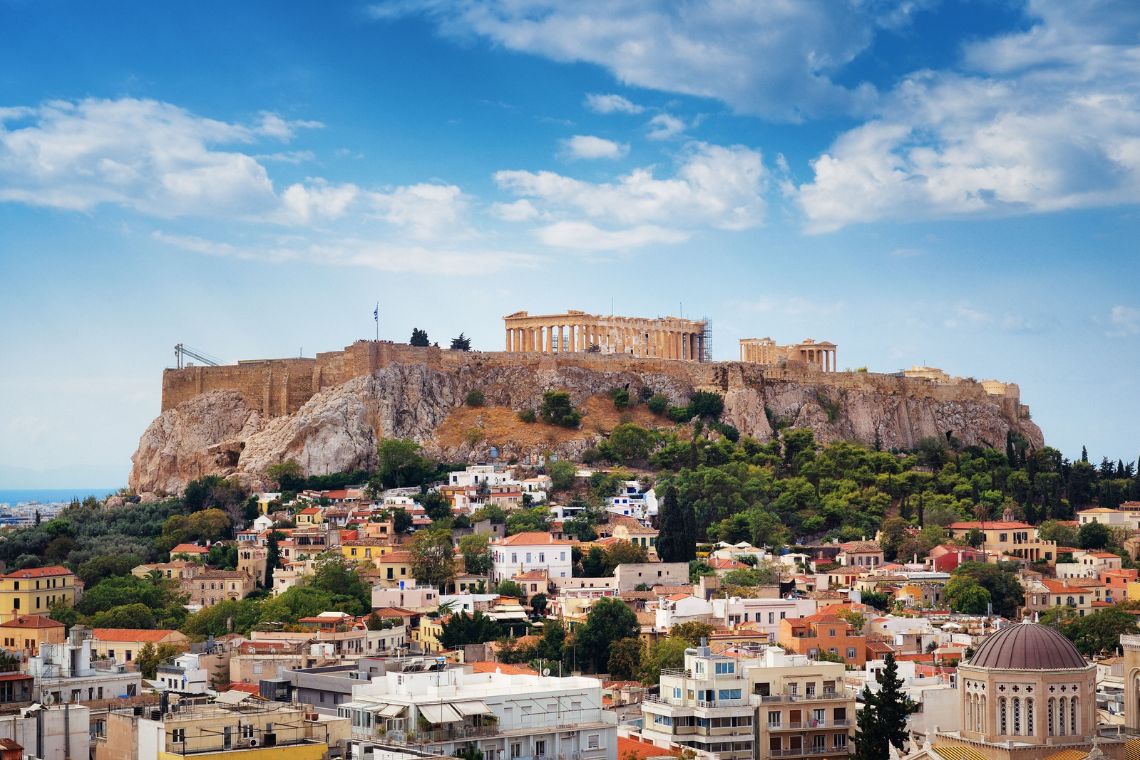5-Day Percy Jackson Mythology Trip
Significance of Draconian Law
Prior to Solon's reforms, Athens was governed by the Draconian law, known for its harshness and severity. While the Draconian law was seen as a strict and often cruel system, it did contribute to the later development of democracy in Athens.
The importance of maintaining written laws accessible to all citizens was one of the aspects carried over from the Draconian law to Solon's reforms. This highlighted the significance of transparency and accountability in governance, crucial to Athenian democracy.
In conclusion, both the reforms of Solon and the influence of Draconian law played a crucial role in the emergence of Athenian democracy. The combination of these reforms and their impact on Athenian society transformed Athens into a city-state that became the birthplace of modern democracy.
The Golden Age of Athens
The Golden Age of Athens: Pericles

Pericles Athens - Credits: chatsimo/ Canva
The Golden Age of Athens, also known as the Age of Pericles, spanned from 480 to 404 BCE. During this time, the Athenian statesman Pericles led the city and implemented numerous initiatives aimed at expanding the city-state's political and cultural influence.
Under his rule, Athens experienced significant economic growth and evolved into an intellectual hub, marking a time of unprecedented creative and academic achievements.
Cultural Achievements
During the Golden Age, Athens became an epicenter for arts and sciences, thanks to the contributions of renowned artists, philosophers, and scholars. Some of the most notable figures who lived and worked in Athens during this period include Herodotus, known as the "father of history," and Socrates, considered the "father of philosophy". This era witnessed a broad spectrum of original ideas and artistic masterpieces that would leave an enduring impact on Western civilization.
The Construction of the Acropolis

Athens Skyline Rooftop - Credits: rabbit75_cav/ Canva
In the heart of Athens lies the Acropolis, an iconic testament to the architectural prowess of ancient Greece. Located atop a limestone hill, the Acropolis features a remarkable collection of temples and buildings that played a significant role in the religious and cultural life of ancient Athenians.
Many of these structures, such as the Parthenon, Erechtheion, and the Temple of Athena Nike, were built during the Golden Age, embodying the essence of Athens as a symbol of power, wisdom, and architectural elegance.
Decline and Revival: Athens Through the Centuries
Roman and Byzantine Periods
The Roman period began in 146 BC, when Rome conquered Greece and Athens became a part of the Roman Empire. Despite the conquest, Athens remained a center for learning and philosophy.
The city saw a revival during the Byzantine period. New buildings were erected, and the old outer circuit of the walls was restored. Athens was once again the cultural capital of the Greek world and a stronghold of paganism. The city's schools attracted scholars from across the empire.
7th–10th Century Dark Age
During the early Middle Ages, Athens experienced a decline in its political and cultural influence. This period, also known as the Dark Age, Athens saw a reduction in population, destruction of monumental buildings, and a limited artistic production. However, the city retained its historical significance and continued to be inhabited.
Ottoman Conquest and Greek Independence
Athens fell to the Ottoman Empire in 1458, marking the beginning of a period of decline. Ottoman rule lasted for almost 400 years; during this time, the city's population shrank, and its cultural and political importance diminished.
However, in 1821, the Greek War of Independence began. After a prolonged struggle, Greece became an independent state, and Athens became its capital in 1834. In conclusion, the history of Athens is marked by periods of decline and revival, with the city always managing to maintain its cultural and historical significance.
Modern Athens: A Blend of Ancient and New

Athens, Greece, Plaka and Monastiraki - Credits: emicristea/ Canva
Today, Athens is a city where a rich historical past coexists with a vibrant and forward-looking modern culture. The perfect blend of modernity and history in Athens demonstrates the city's ability to preserve its ancient heritage while remaining a vital and dynamic contemporary hub.
The ancient architecture of Athens is juxtaposed against innovative modern buildings, creating a unique cityscape. One striking example is the Athens coastline, where a stepped high-rise blends ancient design principles with state-of-the-art materials and techniques. Such architectural fusion highlights the city's ongoing ability to evolve while paying homage to its roots.
In addition to its architectural harmony, Athens is renowned for its modern art scene. Local artists have made their mark on their city's cultural history by drawing inspiration from ancient Greek traditions while infusing a distinct creative flair into their works. Venues such as galleries and street art installations showcase the city's modern culture, reflecting a rich artistic legacy that spans centuries.
A key aspect of modern Athenian life is its vibrant nightlife. Residents and visitors alike can experience the pulsating energy of contemporary Athens through a diverse array of bars, clubs, and music venues that celebrate global influences and the city's own unique identity. This thriving night scene serves as a testament to the modernity of Greek splendor in Athens, where a Mediterranean zest for life shines through.
Visiting Modern Athens: Everything you Should Know
Athens, the capital city of Greece, boasts a glorious history dating back more than 3,000 years, making it an emblem of Western civilization. This vibrant city is home to an array of ancient and contemporary attractions, captivating the hearts of its visitors with its rich culture, delicious cuisine, and incredible archaeological sites.
Must See Archaeological Sites
- The Acropolis: This iconic hilltop citadel is a must-visit site for any traveler. At its center, the magnificent Parthenon stands as a testament to ancient Greek architecture.
- Ancient Agora: Once the heart of Athens, this archeological site features temples, statues, and an impressive agora or marketplace, serving both political and commercial purposes.
- Temple of Zeus: This colossal temple, dedicated to the king of Olympian gods, boasts majestic columns still standing tall, reminding visitors of its former grandeur.
BOOK NOW: Percy Jackson Mythology Tour of Acropolis & Acropolis Museum
Group Type
Small Group, Private
While exploring these historical landmarks, one cannot help but be in awe of the rich heritage and impressive achievements of ancient Athenians. Moreover, Athens also offers a delightful gastronomic experience, with various culinary options to suit every visitor's preferences.
Visiting modern Athens provides an unforgettable experience, with its remarkable archaeological sites and vibrant contemporary aspects. Take the opportunity to immerse yourself in the heart of Western civilization, where the ancient and modern worlds come together in harmony.
FAQs
When was the city of Athens founded?
Athens is recognized as one of the oldest cities in the world and has been continuously inhabited for at least 5,000 years. The city's history can be traced back to the Neolithic period, around 3000 BCE, making it an ancient city of great historical significance. Ancient Greek civilization has left a strong imprint on the city, providing a wealth of insights into the origins of Western civilization.
Which period marks the inception of Athens' history?
Since the beginning during the Neolithic period the city has evolved through various stages of human history, including the Classical period, which saw the rise of democracy and the flourishing of philosophy in ancient Greece.
How long has the city of Athens been inhabited?
Athens has been continuously inhabited for more than 5,000 years, making it one of the oldest cities in the world. This impressive timeline is a testament to the city's remarkable resilience and enduring significance as a hub of human development and progress.



